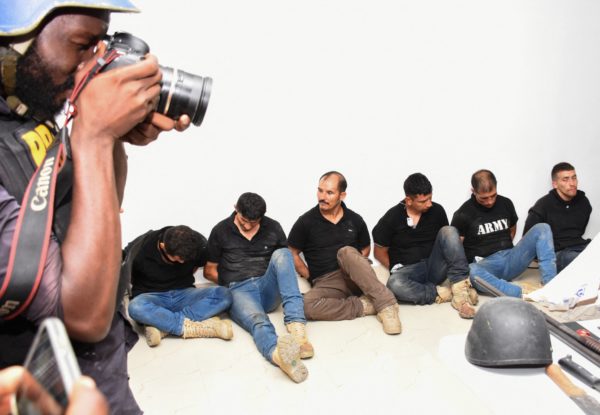The head of Colombia’s police announced on Friday that the Colombian nationals recruited to assassinate Haitian President Jovenel Moïse traveled through the Dominican Republic to carry out the assassination.
Moïse was killed by gunmen in an nighttime attack at his home in Port-au-Prince in the wee hours of Wednesday morning in an assault that also left his wife Martine Moïse seriously wounded. The first lady is being treated for her injuries in a Miami hospital.
The assassination has shoved the Caribbean nation into further instability as the country was already experiencing escalating political upheaval and a rise in killings and kidnappings.
Haitian authorities announced that 28 suspects have been identified in Moïse’s death and that 26 individuals are Colombian, while two are Haitian-American. The two Haitian-Americans were identified as James Solages, 35, and Joseph Vincent, 55, both from Florida. Seventeen of the suspects retired from Colombia’s army between 2018 and 2020, Colombian Gen. Luis Fernando Navarro, the leader of the nation’s military, said Friday.

Eleven Colombian suspects traveled to Haiti through the Dominican Republic city of Punta Cana and arrived in Haiti on July 4, said Gen. Jorge Luis Vargas, the director of Colombia’s national police. Two others traveled to Panama, then to the Dominican city of Santo Domingo, Vargas said.
Vargas said four companies were involved in the “recruitment, the gathering of these people” to carry out the assassination, but did not identify the companies as they are still to be verified.
The Associated Press reported that the wife of one former military Colombian suspect being held by Haitian authorities, Francisco Uribe, said on Colombian radio this week that her husband told her he had been hired by a security firm to private protection work for families in the Dominican Republic last month. The AP described how she learned of her husband’s actual apparent mission:
She says she last spoke to him at 10 p.m. Wednesday — almost a day after Moïse’s killing— and said he was on guard duty at a house where he and others were staying.
“The next day he wrote me a message that sounded like a farewell,” the woman said. “They were running, they had been attacked. … That was the last contact I had.”
The woman said she knew little about her husband’s activities and was unaware he had even traveled to Haiti.
Following more than a day of shootouts and chaotic engagements between gunmen and Haitian in Petionville not far from where Moïse was killed, the Taiwan Embassy, and other sweeps on the Port-au-Prince streets, at least 20 suspects — all but two Colombian — were in custody by Friday evening, The New York Times reported. Authorities are still seeking eight others. Some 11 suspects were seized Thursday at Taiwan’s Embassy, where they are thought to have been trying to hide, after embassy security there called police.
Petionville tribunal judge Carl Henry Destin told Reuters that Moïse was found discovered lying on the floor on his back in his bedroom with 12 bullet wounds and his left eye pushed in. The gunmen apparently encountered little to no resistance from Moïse’s security detail, and Haitian authorities have summoned several to answer questions about this next week.
Moïse’s death has prompted confusion about who is at the helm of the country. Even before he died, some challenged the legitimacy of his claim to a fifth year in office, but since the assassination, two prime ministers are competing for power. Interim Prime Minister Claude Joseph, who had served since April, has taken command and declared a “state of siege,” enforcing martial law. But two days before his death, Moïse selected a new prime minister to replace Joseph, neurosurgeon Ariel Henry. Henry had not yet been sworn in when Moïse was killed but claims he’s the rightful prime minister.
U.S. State Department spokesman, Ned Price referred to Joseph as “the incumbent” and said the U.S. would continue to work with him “as such.” But Price also said American officials have been in contact with Henry, and urged Haitians to work together and “refrain from violence.”
White House Press Secretary Jen Psaki told reporters Friday that FBI investigators and representatives from the Department of Homeland Security will travel to Haiti “as soon as possible,” where they will provide support as the investigation continues.
The Haitian government also requested 500 U.S. troops. The Pentagon responded, “The Haitian government has requested security and investigative assistance, and we remain in regular contact with Haitian officials to discuss how the United States can assist. For anything further, we refer you to the U.S. State Department.”
The Department of Homeland Security has extended Temporary Protected Status to Haiti, a nation of 11 million people, for 18 months.


